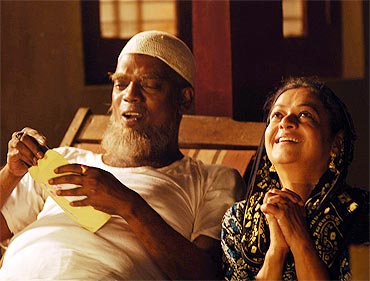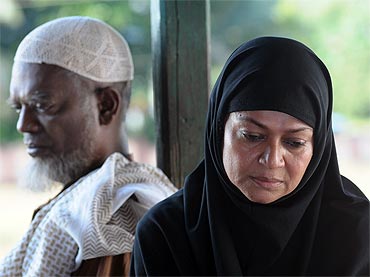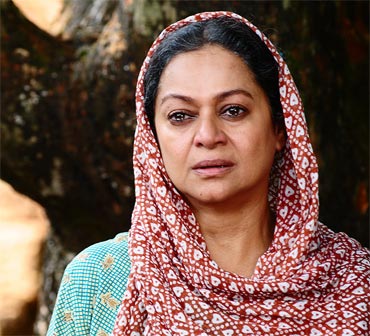Shobha Warrier in Chennai
For Madhu Ambat, the recently announced National Award for cinematography for the Malayalam film Adaminte Makan Abu is his third one.
The first one was for the late GV Iyer's Sanskrit film Aadi Sankaracharya (1983) and the second was for Sarada Ramanathan's Tamil film Sringaram (2007).
Some of the interesting films he has done in his career are National Award winning films like Tabarana Kathe (Girish Kasaravalli), Phaniamma (Prema Karanth), Oppol (K.S.Sethumadhavan) Ankuram (Uma Maheswara Rao) Anjali (Mani Ratnam) and international projects like Provoked (Jag Mundra), Hiss and the first two films of Manoj Night Shyamalan.
In an interview interview, he speaks about working for Adaminte Makan Abu
Firstly, Congratulations for the third national award!
Thanks. I am glad that I got all my three awards for three different languages, first Sanskrit, then Tamil and now, Malayalam.
How did the script come to you?
Someone who worked with me for Lajja called me and said a new director called Salim Ahmed wanted to send me a script. I said, fine. The way Salim narrated the script attracted me.
I saw a lot of passion in him. He did not have a huge budget but that was never a criterion for me. Most of us involved with the film believed in the film and worked almost for free.
In Adaminite Makan Abu, there is poetic realism'
Image: A scene from Adaminte Makan AbuMakara Manju, Gramam and Adaminte Makan Abu You got to shoot varied themes last year!
Yes, it was an exciting year for me. Lenin Rajendran's Makara Manju (with Santosh Sivan and Karthika acting in it) was a kind of fantasy.
It is about a painting by Raja Ravi Varma, which runs parallel to Raja Ravi Varma's life story.
Gramam was about the Brahmin community in Kerala and the story takes place before the independence and ends on the day India wins independence. I have treated it in a very hard-hitting, realistic way. In Adaminite Makan Abu, there is poetic realism.
Was that the mood you thought of when you heard the script narrated?
Yes, that was the feeling I got when I heard the script. Though there is a running feeling of sadness, there was hope throughout. So, I felt it couldn't be as realistic and hard hitting as Gramam. Hope has to be brought out.
What did you do to bring out hope?
The whole lighting pattern was done with that feeling in mind. I do not start a film with a feeling and not a visual. While setting the lights, composing a scene, using a particular lens or choosing the depth of field, you have that feeling in mind.
Sometimes you feel, this is it but sometimes, it isn't. What gives you that feeling, I do not know; it comes from within. It is a part of the creative process. Basically the cinematographer's job is to bring out the internal story of the characters and not the external story, which is what you see on screen. How do you show, for instance, a character who is laughing on the outside but crying inside? I tried to bring out that reality onto the screen.
'This is the first time that a film is shot with digital technology has won a National award'
Image: A scene from Adaminte Makan AbuWhat challenges did you face while showing lives of these two old people who dream of going to Mecca?
There were a lot of financial constraints. But one of the decisions I made was to go for digital. I could well have gone for 16 mm film as 35 mm was costly but I didn't want to use 16 mm because I wanted to shoot lots of long shots.
Why long shots?
To show the feeling of loneliness. They are alone in the world. 16mm doesn't work for long shots. I had shot both Makara Manju and Gramam in 16mm.
Finally, I decided to try out digital for the first time. It is also the first time that a film shot with digital technology has won the national award.
What is the difference shooting digitally and in films?
They're two different mediums like oil and watercolours. It is up to you how to use it. Both the mediums have their own advantages and disadvantages. If I had shot this in film, it might have had a different look, that's all.
I am going to make a crazy, surreal film called Death of Madhu Ambat
Image: A scene from Adaminte Makan AbuWhat attracts you to these small films where there are more challenges in the form of budget constraints when filmmakers are after you to shoot high budget films?
There have been great writers living comfortably in mansions but vanish for a month or two to live like beggars somewhere. They do that to get new experiences and make their brains sharper. It is the same with me.
It isn't like there aren't any challenges in big budget films. They are different. I always want to follow up a big budget movie with 2-3 small films so that your thinking process will not be stuck in a certain way.
After a big-budget Hiss, I chose to do Makara Manju, Gramam and Adaminte Makan Abu. These films sharpen my thinking.
Do these small films give you more creative highs?
No. Bigger films also give you creative high. For example, films like Anjali or Lajja.
Invariably it is the small films that have brought you awards...
In a way, yes! That's probably because small films are more real. Here I must add that in India, especially in Kerala, we have not yet started accepting non-realistic or surreal films.
That is why I am going to make a crazy, surreal film -- the title itself is crazy: Death of Madhu Ambat. It will be directed by Madhu Ambat and it is not autobiographical!
How many days did it take you to shoot Aadaminte Makan Abu?
We finished shooting in 28 days but had to spend 32 days on location near Thrissur waiting for some of the actors to join us.
'An award is recognition of your hard work'
Image: A scene from Adaminte Makan AbuDid you expect a national award?
We all knew that we had a great film in hand. Isaac's (Isaac Thomas Kottukapalli who won the National award for background score for the same film) knowledge of films is amazing, and he said it was a great work. But then, you can never say about awards. It all depends on the jury.
Though all the others who worked in Adaminte Makan Abu won the Kerala State Awards, I did not get it.It all depends on the jury.
There is also a feeling there in Kerala that as I have become internationally known, it is demeaning to give me State awards. It is not like that. An award is recognition of your hard work.
Were you impressed with Salim Kumar's work when you saw him perform?
He astounded me! I had only seen a few of his comedy films. I have not seen his serious performance in Achanurangatha Veedu. After winning the award, I heard him say that it was I who first said he would win an award.
What I said was, his performance was worth an award. I am glad he won the national award. He has done so well, on par with any international actor.
I read somewhere that Zarina Wahab and you were classmates at Pune and you two were meeting after several years...
Yes, we studied together at the Pune Film Institute. So, it was a get-together after 38 years! We had great fun on the sets. Zarina was my assistant when I did a magic show at the Institute (Madhu Ambat's father was the world renowned magician Prof Bhagyanath).
Her head was chopped off in the show! Shabana also was with us. But she doesn't remember that she assisted me. I had the photos with me.
What will your next project be?
Next is Sarada Ramanathan's film in Tamil, which we will start in June. It is about a young man who is about to go to the US but unwittingly gets drawn to child trafficking after he rescues a little girl.
The lead role will be played by Nanda (of Eeram fame), Andrea and a new girl called Sahana (Chawla) from Mumbai.






Comment
article